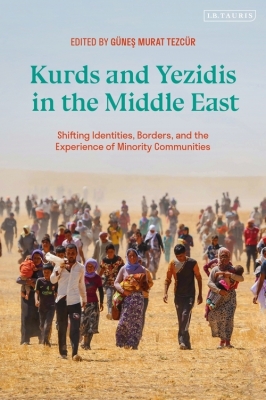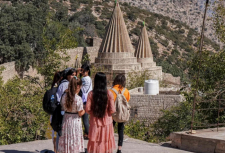Book: Kurds and Yezidis in the Middle East

Shifting Identities, Borders, and the Experience of Minority Communities
Review
The diversity of Kurdish communities across the Middle East is now recognized as central to understanding both the challenges and opportunities for their representation and politics. Yet little scholarship has focused on the complexities within these different groups and the range of their experiences. This book diversifies the literature on Kurdish Studies by offering close analyses of subjects which have not been adequately researched, and in particular, by highlighting the Kurds' relationship to the Yazidis. Case studies include: the political ideas of Ehmede Xani, “the father of Kurdish nationalism”.
The book comprises the leading voices in Kurdish Studies and combines in-depth empirical work with theoretical and conceptual discussions to take the debates in the field in new directions. The study is divided into three thematic sections to capture new insights into the heterogeneous aspects of Kurdish history and identity. In doing so, contributors explain why we need to pay close attention to the shifting identities and the diversity of the Kurds, and what implications this has for Middle East Studies and Minority Studies more generally.
“The innovative, deeply researched, and interdisciplinary chapters in this volume take us beyond the conventional paradigm of Kurds vs. states through their incisive examination of the layers of two open Middle Eastern wounds: the Kurdish issue and the Yezidi tragedy. By weaving together the complicated history and intercommunal relations between the Kurds and the Yezidis, as well as the groups dominating them, the empirically rich essays provide a nuanced account of the factors that have shaped Kurdish and Yezidi identities and their cross-pollinations. Scholars and students of inter-communal relations, ethnic identity, and nationalism will find a mine of information and a multitude of cases to draw on.” – Sabri Ates, Southern Methodist University, USA,
“This book collects interesting papers on Kurdish and Yazidi studies and tries to connect the two fields with each other. Focused on Iraq and Turkey it connects Kurdish and Yazidi experiences and perception as minorities in the Middle East.” – Thomas Schmidinger, University of Vienna, Austria.
“This book makes a path-breaking contribution to Kurdish and Yezidi Studies. By reflecting on contingent political identities, shifting frames of victimhood and unexpected forms of resistance, the book offers critical insights into the politics of identity and collective memory. This is a must read for anyone interested in Kurdish and Yezidi politics.” – Firat Bozcali, University of Toronto, Canada.
Tags: #yazidisinfo #newsyazidi #aboutyazidi #bookaboutyazidi #review
Book: Kurds and Yezidis in the Middle East

Shifting Identities, Borders, and the Experience of Minority Communities
Review
The diversity of Kurdish communities across the Middle East is now recognized as central to understanding both the challenges and opportunities for their representation and politics. Yet little scholarship has focused on the complexities within these different groups and the range of their experiences. This book diversifies the literature on Kurdish Studies by offering close analyses of subjects which have not been adequately researched, and in particular, by highlighting the Kurds' relationship to the Yazidis. Case studies include: the political ideas of Ehmede Xani, “the father of Kurdish nationalism”.
The book comprises the leading voices in Kurdish Studies and combines in-depth empirical work with theoretical and conceptual discussions to take the debates in the field in new directions. The study is divided into three thematic sections to capture new insights into the heterogeneous aspects of Kurdish history and identity. In doing so, contributors explain why we need to pay close attention to the shifting identities and the diversity of the Kurds, and what implications this has for Middle East Studies and Minority Studies more generally.
“The innovative, deeply researched, and interdisciplinary chapters in this volume take us beyond the conventional paradigm of Kurds vs. states through their incisive examination of the layers of two open Middle Eastern wounds: the Kurdish issue and the Yezidi tragedy. By weaving together the complicated history and intercommunal relations between the Kurds and the Yezidis, as well as the groups dominating them, the empirically rich essays provide a nuanced account of the factors that have shaped Kurdish and Yezidi identities and their cross-pollinations. Scholars and students of inter-communal relations, ethnic identity, and nationalism will find a mine of information and a multitude of cases to draw on.” – Sabri Ates, Southern Methodist University, USA,
“This book collects interesting papers on Kurdish and Yazidi studies and tries to connect the two fields with each other. Focused on Iraq and Turkey it connects Kurdish and Yazidi experiences and perception as minorities in the Middle East.” – Thomas Schmidinger, University of Vienna, Austria.
“This book makes a path-breaking contribution to Kurdish and Yezidi Studies. By reflecting on contingent political identities, shifting frames of victimhood and unexpected forms of resistance, the book offers critical insights into the politics of identity and collective memory. This is a must read for anyone interested in Kurdish and Yezidi politics.” – Firat Bozcali, University of Toronto, Canada.
Tags: #yazidisinfo #newsyazidi #aboutyazidi #bookaboutyazidi #review


























